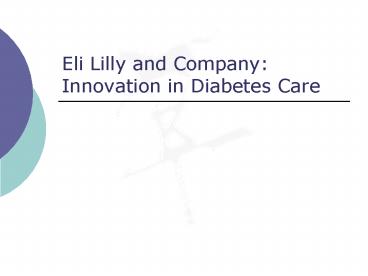Eli Lilly and Company: Innovation in Diabetes Care - PowerPoint PPT Presentation
1 / 18
Title:
Eli Lilly and Company: Innovation in Diabetes Care
Description:
... working on its own line of insulin pen, hoping to reverse its decline in the worldwide market. ... Delivery devices (pens and injection devices) ... – PowerPoint PPT presentation
Number of Views:1083
Avg rating:3.0/5.0
Title: Eli Lilly and Company: Innovation in Diabetes Care
1
Eli Lilly and Company Innovation in Diabetes Care
2
Which company is the worlds dominant producer of
insulin?
- Which company is a major competitior, and had
dominance in Europe (1995)? - Which company was building a new plant in the
U.S. for production of insulin cartridges for its
pen (1995)?
3
- Worlds dominant producer of insulin
- Missed significnat growth opportunities in
diabetic care products. - Market share eroding.
- In 1995, a major competitior (Novo) had dominance
in Europe, and is building a new plant in the
U.S. for production of insulin cartridges for its
pen. - Lilly was working on its own line of insulin pen,
hoping to reverse its decline in the worldwide
market.
4
What is the purpose of this case?
5
- The purpose of this case is
- To help students identify a certain regularity in
the patterns of product competition as markets
mature, and - To recognize that the basis of competition often
evolves from functionality, to reliability, to
convenience., and finally to price.
6
- The initial shift from functionality to
reliability is a result of product innovation
overshooting market need. - We can see that product performance often
progresses at a faster pace than what the market
is able to absorb, creating the possibility for
markets to become over-satisfied.
7
- In this condition, reliability becomes the new
basis for competition. - When the markets needs for reliability are
satiated the basis of competition often shifts
again, this time towards convenience. - In this stage products that are disruptively
simple and convenient become most successful.
8
The Basis of Competition in the Disk Drive
Industry
9
Tell us something about Eli Lilly
10
Eli Lilly
- The Eli Lilly case describes the companys
efforts to develop a series of innovative
products and services in diabetes care. - It invested over a billion dollars to create a
line of genetically engineered human insulin that
were 100 pure and structurally equivalent to
human insulin. The markets reaction to this
technological miracle was tepid, however, because
it was satisfied with the insulin that were
already available on the market. - The case gives students the opportunity to
explore why a very competent company could
overshoot its market so badly. The facts lead us
to point our finger at Lillys main customers
(high end diabetes specialists), who provided
misleading indications of the needs of consumers
in the main stream market.
11
Tell us something about Novo
12
Novo
- In contrast to Lillys technology oriented
struggles to innovate in this market, its main
competitor, Novo Nordisk, introduced a line of
insulin pens which made injection simpler and
more convenient for patients with diabetes. The
basis of competition in diabetes care had shifted
towards convenience, and Novo caught the wave,
nearly doubling its share of the insulin market. - The reading on how the basis of competition
shifts enables students to evaluate different
innovative options facing Lilly, and suggests how
Lilly can take advantage of the markets thirst
for convenience.
13
Classes of Innovation
14
- Improvements in insulin,
- Delivery devices (pens and injection devices),
- Meters and technology to measure blood glucose
levels, - Development of products or services for education
and behavioral change among patients with
diabetes.
15
Consumers-demand trajectory v. technology-performa
nce trajectory
16
Managing Innovation
- Consumers-demand trajectory v. technology-performa
nce trajectory when the later overshoots the
former, dynamics of product competition shifts. - In managing innovation, discerning when the
technology trajectory has overshoot the market is
very important because it heralds a change in the
criteria that consumers use to choose amongst
products.
17
In 1995, the lions share of the cost of diabetic
care was not in insulin or other related products
18
Rather, it was in the treatment of complications
caused by patients not taking care of themselves.































